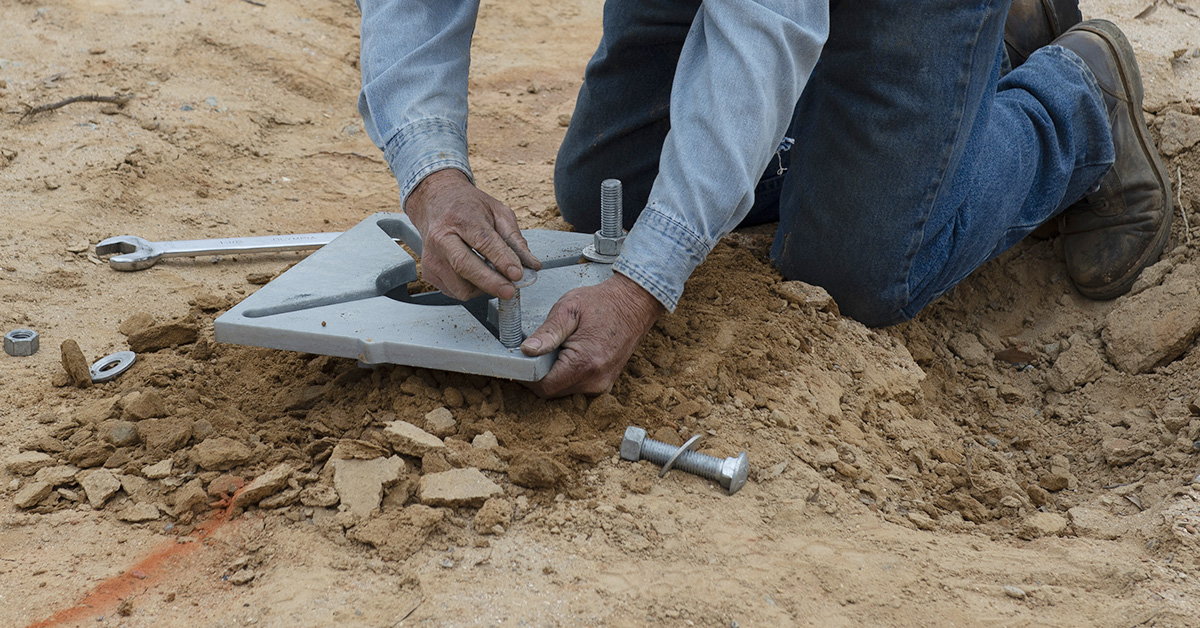In short, soil type and strength matter a lot! In this article about installation requirements, I talk about equipment selection and torque, but soil is another key part of the equation. Instant Foundations are designed as a pole base support for any equipment that will require wiring, such as streetlights, transformers, EV chargers, and bollards.

This is the Chance Soil Classification Table. It breaks down soil types into nine classes – Class 0 through Class 8. The installation requirements for steel screw-in foundations can be based on the soil class.
|
CLASS
|
Suitable for Instant Foundation Installation?
|
Common Soil-Type Description
|
Geological Soil Description
|
Typical Blow Count "N" Per ASTM-D 1586
|
|
0
|
No – do not use
|
Sound hard rock, unweathered
|
Granite, basalt, massive limestone
|
N.A.
|
|
1
|
Yes – but will likely require pre-drilling
|
Very dense and/or cemented sands; coarse gravel and cobbles
|
Caliche, (nitrate-bearing gravel/rock)
|
60-100+
|
|
2
|
Yes – but will likely require pre-drilling
|
Dense fine sands; very hard silts and clays (may be preloaded)
|
Basal till; boulder clay; caliche; weathered laminated rock
|
45-60
|
|
3
|
Yes – but will likely require pre-drilling
|
Dense sands and gravel; hard silts and clays
|
Glacial till; weathered shales, schist, gneiss and siltstone
|
35-50
|
|
4
|
Yes – but MAY require pre-drilling
|
Medium dense sand and gravel; very stiff to hard silts and clays
|
Glacial till; hardpan; marls
|
24-40
|
|
5
|
Yes
|
Medium dense coarse sands and sandy gravels; stiff to very stiff silts and clays
|
Saprolites, residual soils
|
14-25
|
|
6
|
Yes
|
Loose to medium dense fine to coarse sands to stiff silts and clays
|
Dense hydraulic fill; compacted fill; residual soils
|
7-14
|
|
7
|
Yes
|
Loose fine sands; Alluvium; loess; medium - stiff and varied clays; fill
|
Flood plain soils; lake clays; adobe; gumbo, fill
|
4-8
|
|
8
|
No – do not use
|
Peat, organic silts; inundated silts, fly ash very loose sands, very soft to soft clays
|
Miscellaneous fill, swamp marsh
|
0-5
|
Steel screw-in foundations are not suitable for Classes 0 and 8 soils. Class 0 soils are un-weathered, solid bedrock. Class 8 soils are very soft organic soils and very loose granular soils. However, Classes 1 through 7 soils are acceptable for steel screw-in foundations. Soil classes 1-3 are dense to very dense sands and gravel, or very-stiff to hard clay soils. They will likely require pre-drilling. Classes 4, 5, 6, and 7 are suitable for installing steel screw-in foundations, although in some cases Class 4 soils may also require pre-drilling.
The installation torque required to install a screw-in foundation can be estimated based on the soil type and class. The table below estimates the installation torque for a clay or silt fine grained soil based on the Chance soil class and the foundation length. Larger drive heads and installation machines are required to install screw-in foundations into very stiff and dense soils.
| Clay and Silt |
| Length of Instant Foundation (ft) |
Installation Torque (ft-lb) |
| Soil Class 6-7 |
Soil Class 5 |
Soil Class 4 |
| 5 |
6,000 |
10,000 |
14,000 |
| 7 |
7,000 |
12,000 |
16,000 |
| 10 |
9,000 |
13,000 |
17,000 |
Similar to the Clay and Silt Table above, the table below estimates the installation torque for a sand or gravel coarse grained soil based on the Chance soil class and the foundation length. Larger drive heads and installation machines are required to install screw-in foundations into very stiff and dense soils.
| Sand and Gravel |
| Length of Instant Foundation (ft) |
Installation Torque (ft-lb) |
| Soil Class 6-7 |
Soil Class 5 |
Soil Class 4 |
| 5 |
4,000 |
6,000 |
9,000 |
| 7 |
5,000 |
7,000 |
10,000 |
| 10 |
7,000 |
10,000 |
15,000 |
Please note both these tables are an estimate of the required installation torque. Actual torque values will vary.
Soil class is a key factor when selecting the proper drive head and installation equipment. If you have any questions, contact our team of experts at civilconstruction@hubbell.com.

